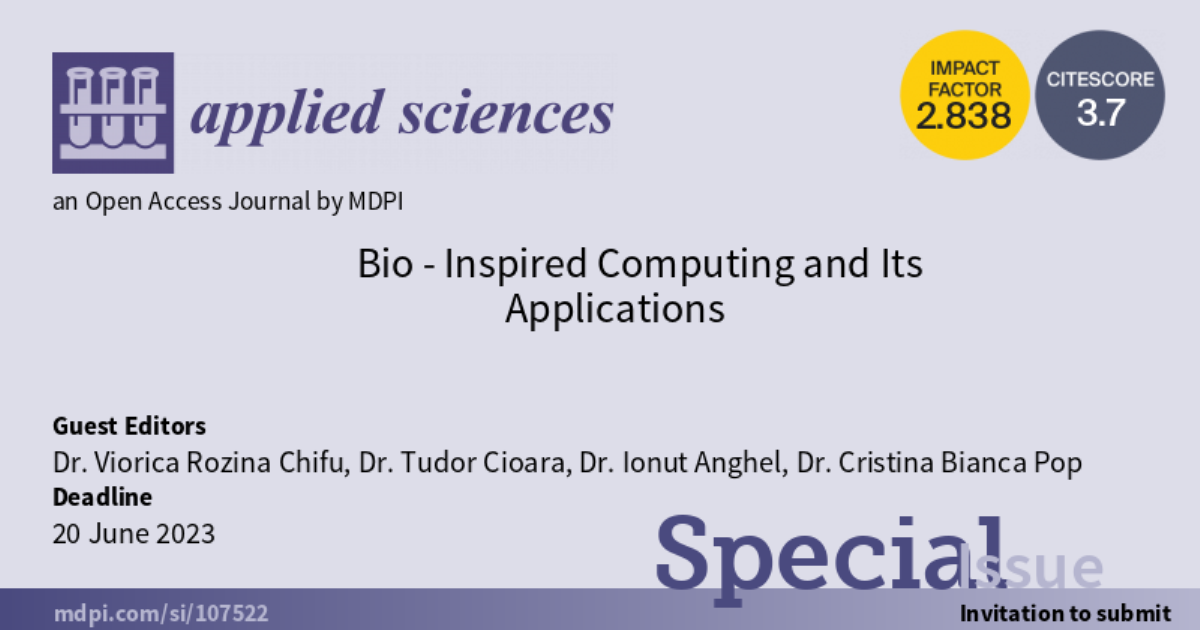- 2.5Impact Factor
- 5.5CiteScore
- 17 daysTime to First Decision
Bio-Inspired Computing and Its Applications
This special issue belongs to the section “Computing and Artificial Intelligence“.
Special Issue Information
Dear Colleagues,
Biology provides many metaphors for designing decentralized models and algorithms for the self-organization, management, and optimization of complex systems. For example, they can be inspired by how: (i) animals or insects can efficiently find food sources, (ii) the biological immune system fights against harmful pathogens, or (iii) the human neural system can efficiently make decisions by the acquisition of useful information, self-organization, reasoning, and learning.
Bio-inspired computing is a frontier research domain that deals with the development of models, techniques, and algorithms inspired by biological mechanisms and living phenomena. Its applications include but are not limited to features selection in machine learning, parameters optimization in deep neural networks, build of self-organizing systems, design of robots, adaptability, and energy efficiency in large-scale distributed systems.
The purpose of this Special Issue is to present recent advancements in the design and development of bio-inspired computational methods and their applications in different fields such as healthcare, transport systems, logistic chains, smart grids, and smart cities, etc.
Potential topics include but are not limited to the following:
- Smart transportation and logistic chains;
- Decentralised coordination of swarm of robots/drones;
- Management of smart energy grids;
- Bio-inspired communication and blockchain technology;
- Artificial intelligence and machine learning;
- Industry 4.0;
- Metaverse and AR/VR;
- Smart cities;
- Health care and active aging.
Dr. Viorica Rozina Chifu
Dr. Tudor Cioara
Dr. Ionut Anghel
Dr. Cristina Bianca Pop
Guest Editors
Manuscript Submission Information
Manuscripts should be submitted online at www.mdpi.com by registering and logging in to this website. Once you are registered, click here to go to the submission form. Manuscripts can be submitted until the deadline. All submissions that pass pre-check are peer-reviewed. Accepted papers will be published continuously in the journal (as soon as accepted) and will be listed together on the special issue website. Research articles, review articles as well as short communications are invited. For planned papers, a title and short abstract (about 250 words) can be sent to the Editorial Office for assessment.
Submitted manuscripts should not have been published previously, nor be under consideration for publication elsewhere (except conference proceedings papers). All manuscripts are thoroughly refereed through a single-blind peer-review process. A guide for authors and other relevant information for submission of manuscripts is available on the Instructions for Authors page. Applied Sciences is an international peer-reviewed open access semimonthly journal published by MDPI.
Please visit the Instructions for Authors page before submitting a manuscript. The Article Processing Charge (APC) for publication in this open access journal is 2400 CHF (Swiss Francs). Submitted papers should be well formatted and use good English. Authors may use MDPI's English editing service prior to publication or during author revisions.
Keywords
- bio-inspired computing
- machine learning
- artificial intelligence
- descentralzied applications
- self-organization, adaption, and evolution
- energy efficiency
- metaverse

Benefits of Publishing in a Special Issue
- Ease of navigation: Grouping papers by topic helps scholars navigate broad scope journals more efficiently.
- Greater discoverability: Special Issues support the reach and impact of scientific research. Articles in Special Issues are more discoverable and cited more frequently.
- Expansion of research network: Special Issues facilitate connections among authors, fostering scientific collaborations.
- External promotion: Articles in Special Issues are often promoted through the journal's social media, increasing their visibility.
- Reprint: MDPI Books provides the opportunity to republish successful Special Issues in book format, both online and in print.


